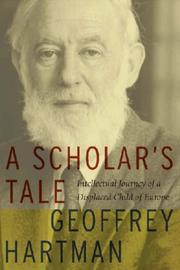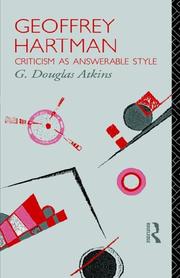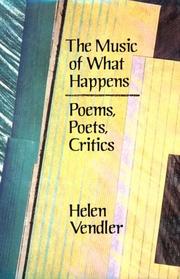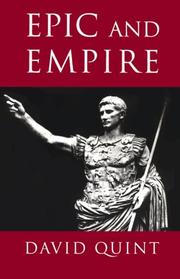| Listing 1 - 5 of 5 |
Sort by
|

ISBN: 0823246957 128269877X 9786612698774 0823237273 0823228347 0823228320 0823228339 Year: 2007 Publisher: New York : Fordham University Press,
Abstract | Keywords | Export | Availability | Bookmark
 Loading...
Loading...Choose an application
- Reference Manager
- EndNote
- RefWorks (Direct export to RefWorks)
For more than fifty years, Geoffrey Hartman has been a pivotal figure in the humanities. In his first book, in 1954, he helped establish the study of Romanticism as key to the problems of modernity. Later, his writings were crucial to the explosive developments in literary theory in the late seventies, and he was a pioneer in Jewish studies, trauma studies, and studies of the Holocaust. At Yale, he was a founder of its Judaic Studies program, as well as of the first major video archive for Holocaust testimonies.Generations of students have benefited from Hartman’s generosity, his penetrating and incisive questioning, the wizardry of his close reading, and his sense that the work of a literary scholar, no less than that of an artist, is a creative act. All these qualities shine forth in this intellectual memoir, which will stand as his autobiography. Hartman describes his early education, uncanny sense of vocation, and development as a literary scholar and cultural critic. He looks back at how his career was influenced by his experience, at the age of nine, of being a refugee from Nazi Germany in the Kindertransport. He spent the next six years at school in England, where he developed his love of English literature and the English countryside, before leaving to join his mother in America.Hartman treats us to a “biobibliography” of his engagements with the major trends in literary criticism. He covers the exciting period at Yale handled so controversially by the media and gives us vivid portraits, in particular, of Harold Bloom, Paul de Man, and Jacques Derrida.All this is set in the context of his gradual self-awareness of what scholarship implies and how his personal displacements strengthened his calling to mediate between European and American literary cultures. Anyone looking for a rich, intelligible account of the last half-century of combative literary studies will want to read Geoffrey Hartman’s unapologetic scholar’s tale.
Book
ISBN: 9781441193247 1441193243 1441140492 9786612765766 1441166041 1472542444 1282765760 9781441166043 9781472542441 9781441140494 Year: 2010 Publisher: London Continuum
Abstract | Keywords | Export | Availability | Bookmark
 Loading...
Loading...Choose an application
- Reference Manager
- EndNote
- RefWorks (Direct export to RefWorks)
Geoffrey Hartman: Romanticism after the Holocaust offers the first comprehensive critical account of the work of the American literary critic Geoffrey Hartman. The book aims to achieve two things: first, it charts the whole trajectory of Hartman's career (now more than half a century long) while playing close attention to the place of his career in broader cultural and intellectual contexts; second, it engages with contemporary discussions about ecology, ethics, trauma, the media, and community in order to argue that Hartman's work presents a surprisingly consistent and original position in cu
Hartman, Geoffrey H. --- Criticism --- Romanticism --- History --- 82.09 --- 82.09 Literaire kritiek --- Literaire kritiek --- Pseudo-romanticism --- Romanticism in literature --- Aesthetics --- Fiction --- Literary movements

ISBN: 1134976895 1280463325 9786610463329 0203002210 9780203002216 9780415020947 0415020948 0415020948 9781134976843 9781134976881 9781134976898 9781138009059 1138009059 1134976887 9781280463327 6610463328 Year: 1990 Publisher: London New York Routledge
Abstract | Keywords | Export | Availability | Bookmark
 Loading...
Loading...Choose an application
- Reference Manager
- EndNote
- RefWorks (Direct export to RefWorks)
`The critic explicitly acknowledges his dependence on prior words that make his word a kind of answer. He calls to other texts ""that they might answer him.""' Geoffrey Hartman is the first book devoted to an exploration of the `intellectual poetry' of the critic who, whether or not he `represents the future of the profession', is a unique and major voice in twentieth-century criticism. Professor Atkins explains clearly Hartman's key ideas and places his work in the contexts of Romanticism and Judaism on which he has written extensively. In Geoffrey Hartman he
Criticism --- Reader-response criticism. --- Reader-oriented criticism --- Reception aesthetics --- Reading --- History --- Hartman, Geoffrey H. --- Reader-response criticism --- Critique --- Esthétique de la réception --- Histoire

ISBN: 0674591526 Year: 1988 Publisher: Cambridge (Mass.) : Harvard university press,
Abstract | Keywords | Export | Availability | Bookmark
 Loading...
Loading...Choose an application
- Reference Manager
- EndNote
- RefWorks (Direct export to RefWorks)
Dichtkunst --- Poetry --- Poésie --- Poëzie --- American poetry --- English poetry --- Poetry. --- History and criticism. --- 20th century --- History and criticism --- Ashbery, John Lawrence --- Criticism and interpretation --- Bloom, Harold --- Clampitt, Amy --- Dickinson, Emily Elizabeth --- Eliot, Thomas Stearns --- Ginsberg, Allen --- Hartman, Geoffrey H. --- Hughes, Ted --- Lowell, Robert Traill Spence, Jr. --- Merrill, James Ingram --- Plath, Sylvia --- Pound, Ezra Loomis --- Rich, Adrienne --- Sexton, Anne Harvey --- Smith, David Jeddie --- Spender, Stephen Harold --- Stevens, Wallace --- Whitman, Walt

ISBN: 0691015201 Year: 1992 Publisher: Princeton, N.J. Princeton University Press
Abstract | Keywords | Export | Availability | Bookmark
 Loading...
Loading...Choose an application
- Reference Manager
- EndNote
- RefWorks (Direct export to RefWorks)
Alexander the Great, according to Plutarch, carried on his campaigns a copy of the Iliad, kept alongside a dagger; on a more pronounced ideological level, ancient Romans looked to the Aeneid as an argument for imperialism. In this major reinterpretation of epic poetry beginning with Virgil, David Quint explores the political context and meanings of key works in Western literature. He divides the history of the genre into two political traditions: the Virgilian epics of conquest and empire that take the victors' side (the Aeneid itself, Camoes's Lusíadas, Tasso's Gerusalemme liberata) and the countervailing epic of the defeated and of republican liberty (Lucan's Pharsalia, Ercilla's Araucana, and d'Aubigné's Les tragiques). These traditions produce opposing ideas of historical narrative: a linear, teleological narrative that belongs to the imperial conquerors, and an episodic and open-ended narrative identified with "romance," the story told of and by the defeated. Quint situates Paradise Lost and Paradise Regained within these rival traditions. He extends his political analysis to the scholarly revival of medieval epic in the late eighteenth and nineteenth centuries and to Sergei Eisenstein's epic film, Alexander Nevsky. Attending both to the topical contexts of individual poems and to the larger historical development of the epic genre, Epic and Empire provides new models for exploring the relationship between ideology and literary form.
Epic poetry --- Literary form. --- Literature and history. --- History and criticism. --- Genres [Letterkundige ] --- Genres [Literaire ] --- Genres littéraires --- Geschiedenis en literatuur --- Geschiedenis en poëzie --- Histoire et littérature --- Histoire et poésie --- Letterkundige genres --- Littérature et histoire --- Poésie et histoire --- Poëzie en geschiedenis --- Poetry --- History --- History and criticism --- Literature and history --- Literary form --- Politiek. --- Epiek. --- Epic poetry. --- 17.86 literary genres, theory of genre. --- Heroic poetry --- History and literature --- History and poetry --- Poetry and history --- Form, Literary --- Forms, Literary --- Forms of literature --- Genre (Literature) --- Genre, Literary --- Genres, Literary --- Genres of literature --- Literary forms --- Literary genetics --- Literary genres --- Literary types (Genres) --- Literature --- Acoma pueblo. --- Ahl, Frederick. --- Ancients and Modems. --- Ascoli Piceno. --- Barchiesi, Alessandro. --- Barlow, Joel. --- Bentley, Richard. --- Borges, Jorge Luis. --- Brecht, Bertolt. --- Brooks, Peter. --- Caesar, Julius. --- Caesarion. --- Carausius. --- Cicero. --- Cleanthes. --- Dias, Bartolomeu. --- Donation of Constantine. --- Duggan, Joseph. --- Eikon Basilike. --- Empson, William. --- Este family. --- Fawkes, Guy. --- Fowler, Alastair. --- Fronde. --- Getto, Giovanni. --- Guarini, Battista. --- Góis, Damião de. --- Hartman, Geoffrey. --- Herodotus. --- Horace. --- Jamestown settlement. --- Josephus. --- Kalevala. --- Lagos, Ramona. --- Leo X, Pope. --- Loyola, Ignatius. --- Martello, Francesco. --- Michel, Francisque. --- Moctezuma. --- Naevius. --- Napoleon Bonaparte. --- New Historicism. --- Onate, Juan de. --- Parthia and Parthians. --- Peisistratus. --- Polybius. --- Quintilian. --- anabaptism. --- census. --- civil war. --- history and narrative. --- imitation.
| Listing 1 - 5 of 5 |
Sort by
|

 Search
Search Feedback
Feedback About UniCat
About UniCat  Help
Help News
News